Current as of: December 23, 2025 - 12:33

Kenya & Tanzania Adventure Trip Notes
- Ways to Travel: Guided Group
- Destination: Kenya, Tanzania
- Programmes: Wildlife
-
Activity Level:
2 out of 7 - Easy & Moderate
- 14 Days: Land Only
- Ages: 16+
- Trip Code: WYK
- Carbon Footprint: 22kg CO2e
Trip Overview
Enjoy excellent game viewing, scenery and exotic Zanzibar
Kenya and Tanzania are home to some of the most prolific game-viewing locations, not just in Africa, but the world. This itinerary takes in several national parks in and around the Great Rift Valley, giving us the opportunity to observe some of the best wildlife and scenery in Africa . It finishes in style on the spice island of Zanzibar, a tropical paradise with white-sand beaches and fascinating Stone Town.
At a Glance
- Accommodation: 4 Classic nights (hotel), 9 Simple nights (full-service camping)
- Travel by specialist overland vehicle and internal flight to Zanzibar
- Group normally 5 to 18, plus leader. Minimum age: 16
Highlights
- Experience some of the best wildlife-watching opportunities in Kenya and Tanzania
- Search for endangered rhinos on game drives in Lake Nakuru National Park
- Explore the grasslands of the Masai Mara and the Serengeti for iconic safari animals
- Marvel at the Ngorongoro Crater, the largest unbroken caldera in the world
- Visit the exotic spice island of Zanzibar and relax on the coast
Is This Trip for You?
This trip is graded Activity Level 2 (Easy & Moderate) and has a Wildlife Rating of Four. For more information on our trip gradings, visit the Activity Level Guidelines page or our Wildlife Holidays page for more on our Wildlife Ratings. If you have any queries about the difficulty of the trip, please contact us.
Driving: To pack so much into a short time, there are some long drives; although the distances are not great, some of the roads are quite poor and bumpy especially after the rainy seasons. We include breaks for toilet facilities, shopping, photos and meals. The spectacular scenery and glimpses of village life make the journeys more enjoyable but come with an adventurous spirit for a trip of a lifetime.
Tanzania Flight Safety: The EU has recently introduced restrictions on all Tanzanian-registered flight operators. These restrictions are related to operational compliance by the Tanzanian Civil Aviation Authority, rather than to individual airlines themselves. On this itinerary, the only route affected is the internal flight between Arusha and Zanzibar. While domestic flying in Tanzania requires careful consideration, we want to reassure you that Exodus only works with Tanzanian carriers that are either accredited by internationally recognised safety auditing bodies (IOSA & ISSA) or have been approved by our independent aviation safety auditors. Independent audits include annual on-the-ground visits to carriers based in Tanzania. If any concerns arise about the safety of an airline on our approved list, we will immediately remove it from our operations and only reinstate it once our air-safety experts are satisfied that it meets the required standards.
Water safety: This trip includes time by a lake, river or sea, where there may be opportunities to swim. You should always seek local advice before deciding whether to swim. Open-water or wild swim spots should be treated with extreme caution. Information on how to keep yourself safe while swimming is shown here.
Group
There is a local leader, driver and cook and local guides where needed.
Adult min age: 16
Min group size: 5
Max group size: 18
Itinerary

Land Only
- Start City: Nairobi
- End City: Zanzibar
Land Only Itinerary
You can arrive at the start hotel at any time today. There are no activities planned, so relax and settle into Nairobi life. To make things easy, there are free transfers available from the airport, see the Joining Instructions in the Trip Notes for more information.
Accommodation: Heron Portico Hotel (or similar)
We travel west into the Great Rift Valley to the lakeside town of Naivasha. This is a lovely scenic route that takes us to Naivasha, which is where we stay for the night. While the crew set up the camp, you can enjoy a boat ride, where you have the chance to spot some of beautiful birdlife and elusive hippos.
Accommodation: Crescent Campsite, Oloiden Camp (or similar) – full-service camping

This morning, we drive to Lake Nakuru National Park, where we enjoy a superb game drive. Although small, the park is home to an amazing variety of animals and birdlife. It also has a soda lake, which is sometimes home to thousands of flamingos. We hope to see endangered white and black rhinos, lions and, if we are very lucky, the elusive leopard. There is a stunning view above the lake from Baboon Cliffs and here we may see a rock hyrax, a small, furry relative of the elephant. Tonight, we stay just outside the park in a campsite with good showers and flush toilets.
Accommodation: Nderit Campsite or similar (full-service camping)

Today we travel into the Masai Mara, one of the most famous ecosystems in the world. This vast grassland is teeming with life; plains game including wildebeest, gazelle, topis, zebras and buffalos, and never far away are the predators: cheetahs, lions and hyenas. Between mid-August and late October, one of the greatest spectacles on Earth takes place in the Mara – the annual migration of thousands of wildebeest, gazelles and zebras. Nothing is guaranteed on safari but, with the help of our brilliant guides, you should see and learn a huge amount about the resident wildlife as we game drive through the park this afternoon. We stay in a campsite just outside the reserve for the next two nights.
Accommodation: Mara Springs Camp or similar (full-service camping)

We have a full-day game drive in the Masai Mara to increase our chances of encountering many of the wildlife species in the reserve. We find a quiet spot inside the park to enjoy lunch by our vehicle, looking across the plains. There are also several optional excursions you can enjoy today in addition to the game drive, including visiting a traditional Maasai village to meet the residents.
Accommodation: Mara Springs Camp or similar (full-service camping)
Our long drive today is up through the Western Highlands and allows plenty of time to appreciate the superb scenery. The road begins to descend and we leave the neatly ordered rows of tea bushes as we cross the border into Tanzania at Isebania. We camp in a pleasant spot at Musoma on the shore of Lake Victoria.
Accommodation: Matvilla Beach Lodge & Campsite or similar (full-service camping)

Today, we turn east and enter the vast Serengeti Plain, one of the largest parks in Africa. There is a choice of routes into the Serengeti, depending on the weather: if it is dry, the 80mi (130km) Western Corridor is open and usually full of plains game. If it is wet, however, this road, which is built on black cotton soil, is impassible and we must enter the park from the north at Ndabaka gate. We spend two nights in the park so we have plenty of time to enjoy the vast open spaces and the variety of game. We camp at Seronera, where there are various camping areas, all in open bush with no fences to prevent the animals from visiting during the night. A real taste of wild Africa!
Accommodation: Serengeti Public Campsite or similar (full-service camping)
We leave early and it is often possible to watch elephants and other animals browsing close to the campsite. The morning is spent game driving in the eastern part of the park, where it is unusual not to spot a pride of lions in their favourite place: under a big, shady tree. After crossing the vast grasslands, we come to the Ngorongoro entry gate at Naabi Hill. We travel up towards the edge of the Ngorongoro Crater, the wide-open plains below stretching as far as the eye can see. Finally reaching the top, the crater opens in front of us: a huge, natural caldera, one of the great sights of Africa.
The Ngorongoro Crater is the largest unbroken caldera in the world, formed when a volcano top erupts, leaving fertile plains in its place. Before this happened, it was the highest mountain in Africa, towering over nearby Kilimanjaro. The crater is essentially made of grassy plains, lush forest and a soda lake, which houses flamingos and an array of birdlife. From the rim, at an altitude of 7,875ft (2,400m), the cliff plunges down some 1,970ft (600m) to the crater floor with a whole host of extinct volcanoes ringing the valley. Our campsite here is very basic and can be very cold at night, so please come prepared.
Accommodation: Simba Campsite or similar (full-service camping)
We descend to the crater floor in 4×4 vehicles and spend the morning watching large numbers of plains game, and the ever-present predators around them. We search for hippos in the murky pools and try to protect our food at lunchtime from the fearless brown kites, as they swoop and snatch anything that appears to be edible.
After a fantastic morning, we continue our journey to the edge of the Rift Valley, where there is a great view over Lake Manyara (often tinted pink around the edges from large numbers of flamingos) and to Arusha.
Accommodation: Njiro Legacy or similar (full-service camping)
We take a morning flight to Zanzibar, an island 22mi (35km) from the mainland. First visited by Arab traders in the eighth century, and countless travellers in the following centuries, it is most famous for its spices and was once the centre of the East African slave trade. We spend our first night in Stone Town and then two nights by the beach. Stone Town is a myriad of small alleys and markets. We recommend a spice tour around the island plantations with chances to taste and buy.
Accommodation: Tembo Hotel/Mizingani Hotel (or similar)
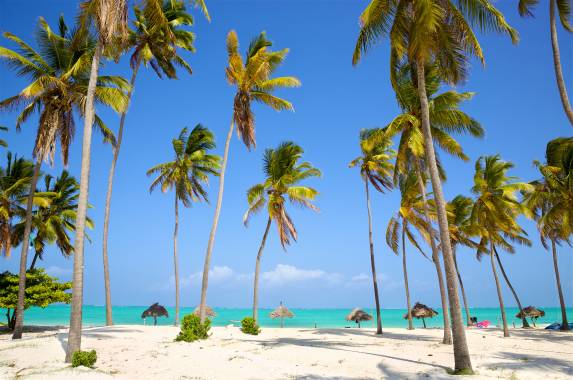
After a free morning in Stone Town, we transfer to our hotel by the beach. There is plenty to occupy your days here. You can relax on the eastern and northern beaches, with excellent snorkelling, sailing in a dhow and plenty of fresh seafood. The local buses are efficient and enable you to travel all over the island, although hiring a 4×4 for a day or two is a more exciting way of getting about and not expensive. It’s a fascinating mixture of culture, history and wonderful beaches.
Accommodation: Mnarani Beach Cottages / Sunset bungalows (or similar)
Our adventure ends after breakfast and we begin our return journeys home. If you’d like more time to explore, speak to your sales representative about extending your stay.
Our adventure ends after breakfast. Those on the group flights will be transferred back to Stone Town for their flight to London.
Accommodation
Hotels and camping

We begin and end this East African adventure in hotels, spending one night in the centre of Nairobi and three nights relaxing in Zanzibar. We also spend nine nights camping, allowing us to fully immerse ourselves in the wild.
Hotels
Nairobi: Heron Hotel (night 1)
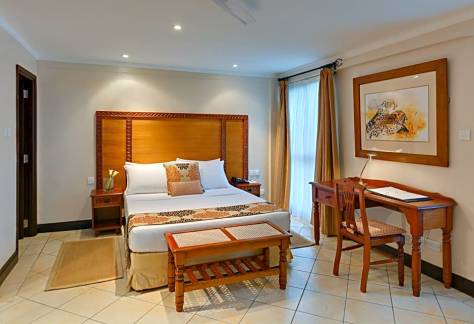
We ease into the adventure with a stay at the Heron Hotel in the centre of Nairobi. If you’re itching to explore, tourist attractions such as Uhuru Park, Central Park and the Kenyatta Mausoleum are a short taxi-ride away. If not, the hotel has a heated pool, sauna and gym. What’s more, the Bashasha restaurant offers all-day dining with light meals and snacks, while the Mdalasini restaurant features a sunny patio and balcony and serves international dishes.
Stone Town, Zanzibar: Tembo Hotel/Mizingani Hotel (night 11)
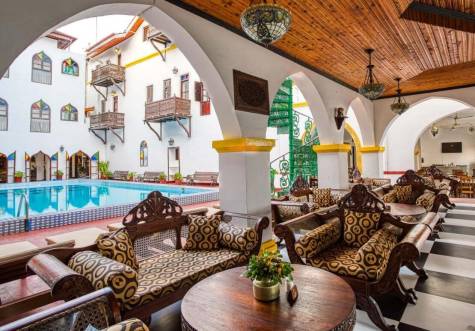
In Stone Town, we spend the night at either the Tembo(above), the first beachfront hotel in Stone Town, or Mizingani. The former has a courtyard pool, plus a restaurant where you can sit on the verandah sipping freshly pressed juices with views over the Indian Ocean. The latter, which sits in a building constructed for royal honeymooners in 1865, is also on the seafront and has a courtyard pool and restaurant.
Nungwi, Zanzibar: Crystal Beach Resort (nights 12-13)
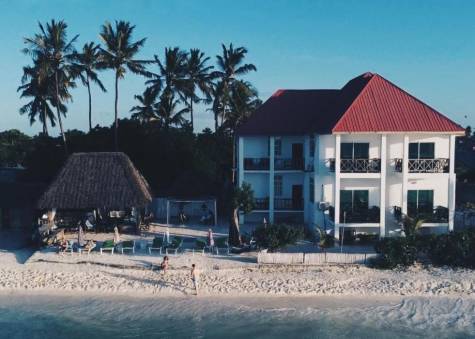
Just a few sandy-footed steps from Nungwi Beach, the Crystal Beach Resort is our spot to flop at the end of our adventure. The location is an obvious plus, but the property also has a garden, restaurant and bar, where you can relax and gather with the group and reminisce about the trip.
Camping
Camping on this trip is full-service, which means the tents are put up for you. All camping equipment (including mattresses) is provided except sleeping bags. Campsites in East Africa usually only have basic facilities – bring your adventurous spirit! – and there are no swimming pools at the campsites we use.
Below are the campsites we typically use on this trip and a rundown of their facilities:
Naivasha: Crescent Campsite (night 2)

- Fire pit
- Neighbouring restaurant and cafe
- Shared long-drop toilets
- Hot showers
Lake Nakuru National Park: Nderit Campsite (night 3)
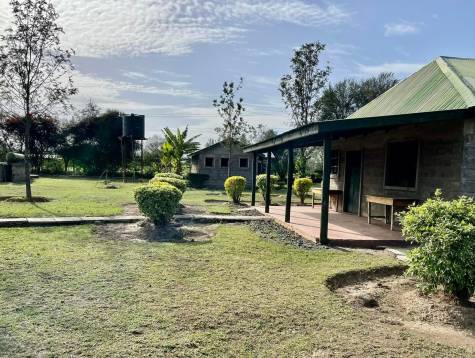
- Kitchen facilities
- Shared toilets
- Hot showers
Masai Mara: Mara Springs Camp (nights 4-5)
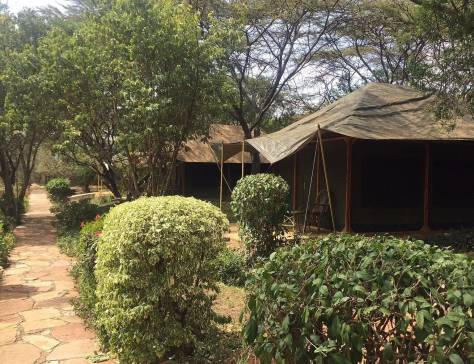
- Hot showers
- Restaurant
- Bar
Matvilla Beach Lodge & Campsite: Campsite (night 6)

- Private beach
- Restaurant
Serengeti: Public Campsite (nights 7-8)
- Shared toilets and bathrooms
- Cold showers
Ngorongoro: Simba Campsite (night 9)

- Hot showers
- Shared toilets
Arusha: Njiro Legacy (night 10)

Single supplement from £ 315
Food & Drink
All meals are included except lunch and dinner on Zanzibar; you should allow a further US$200 for these.
All included meals are prepared for you by our chef and crew. They are adept at catering for large groups of hungry travellers! Breakfasts usually include cereal, toast and hot food, such as porridge or eggs. Lunches tend to feature a range of sandwich options plus a selection of fruit. Dinners usually feature soup, a main (a mix of local and international cuisine) and dessert. All cooking equipment is loaded onto the overland vehicle and so our crew are ready to prepare food wherever we stop – don’t worry about going hungry on this trip! You have time to stock up on snacks and drinks along the journey.
Transport
Transport is in a specialist overland vehicle. These are ideal vehicles for seeing Africa, being robust enough to cope with some of the inevitably bad and bumby roads and having good visibility for the excellent scenery and game parks. The seats are bucket seats and have some padding. They have seat belts. There is no air-con, but the windows open. The luggage is kept in lockers at the back of the truck and there are overhead racks. The truck carries all the necessary camping equipment and is equipped with a large drinking-water tank. We travel in 4×4 vehicles in Ngorongoro Crater. During the rainy season, a 4×4 may be used in the Masai Mara.
The driving distances and times are as follows:
- Nairobi to Crescent Campsite: 53mi (85km), two hours
- Crescent Campsite to Nakuru: 53.5mi (86km), 2hr 30min
- Nakuru to Masai Mara: 141mi (227km), nine hours
- Masai Mara to Lake Victoria: 192mi (310km), 10 hours or more, depending on the border crossing
- Lake Victoria to Serengeti: 118mi (190km), nine hours
- Serengeti to Ngorongoro: 84mi (135km), eight hours
- Ngorongoro to Arusha: 99mi (159km), eight hours
Weather & Seasonality
Although this part of East Africa lies in the tropics, the temperature depends more on altitude than on season. Kenya and northern Tanzania have temperatures around 20C (68F) in March and dropping to 15C (59F) in August, or perhaps a little lower, which can feel cold. The long rains, during which we do not operate these tours, occur in April and May, and there are intermittent ‘short rains’ between November and January, though these normally have no great effect on the safari. It is much warmer near the coast, usually around 31C (89F) and very humid but there is often a cooling breeze.
Joining Instructions
Key information
Start hotel: Heron Portico Hotel, Jakaya Kikwete Road, opposite Provincial Police Headquarters Nairobi, Kenya
Phone number: +254 20 2720740/41; +254 731 888 100
Recommended arrival time: If you’re booking your own flights, you can arrive at any time on Day 1
Airport: Nairobi Airport (NBO)
Getting to the start hotel
The start hotel is approximately 30-45 minutes’ drive from the airport. We provide free arrival transfers to the start hotel from the airport for everyone. If you would like further information on joining this trip, please speak to your sales representative.
Please note, unless specified otherwise, the transfer to the start (or pre-tour) hotel will be on the date on which the tour starts; transfers to other hotels in the same city and/or on different dates may attract an extra charge. Transfers should be booked with your sales representative at least two weeks before the tour starts.
Catching your return flight
Departure transfers to Zanzibar Airport (ZNZ) are provided for those travelling on a selected flight to London, UK. Please speak to your sales representative if you wish to join. If the group departure transfer does not suit your flight time, speak to your sales representative to arrange an alternative transfer.
Full joining instructions including local emergency numbers will be sent to you as part of our Final Joining Instructions. If you do not receive these at least a week before departure, or require them earlier please contact our office or your travel agent.
Location start: Nairobi
Location end: Zanzibar
What To Take
Essential Equipment
This trip encounters a range of temperatures, so come prepared. Most of the time, light cotton clothing is most comfortable, but you should bring a sweater and a warm windproof jacket as it can get cold at night, in the mornings and in the back of the truck. Avoid bright colours on safari.
- Backpack or small bag
- Water bottle
- Headtorch (head lamp) and spare batteries
- Mosquito repellent
- Sun hat, sunscreen and sunglasses
- Travel towel
- Sleeping bag and liner: a three-season bag is required as it can be cold at night
- Travel pillow: We do not provide pillows in the two-person tents, so if you would like a travel pillow, please bring your own
- Sleeping mat is provided but for extra comfort you may like to bring your own to have double
- Backpack or kitbag: Please do not bring a suitcase or hard-bottomed bag on these trips. We advise you to bring a soft kitbag/backpack and a smaller backpack for the day. Everyone has a large locker (75cm/30in deep, 48cm/19in long and 25cm/10in high) to store their belongings. We recommend you also take a combination padlock to lock it. Shoes and sleeping bags can be stored separately at the back of the vehicle.
Please note, on the internal flight to Zanzibar, you are allowed to take hand luggage weighing up to 11lb (5kg) in addition to the 44lb (20kg) checked baggage.
In a move praised by conservation groups and health organisations, Kenya, Tanzania and Zanzibar have taken the lead in banning the use of plastic carrier bags and certain other plastic bags. Included in the ban are the following items that travellers might carry:
- Duty-free carrier bags
- General shopping bags
- Bin (trash can) liners (sometimes used to protect luggage during rain)
- Dry-cleaning bags (commonly wrapped around clothing)
- Ziplock bags
Travellers arriving into Kenya, Tanzania and Zanzibar via airports, sea ports or land borders are required to leave any bags deemed to be on the banned list at the point of entry and risk facing heavy fines.
Water included: Plastic bottles are a big issue in many countries where recycling isn’t yet widely available; they often end up in landfill or get burned. Both processes are harmful to the environment and we would like to reduce our impact here. For your trip, we provide an alternative to single-use plastic bottles to reduce the plastic used. This means that safe drinking water will be available throughout; all you need to do is bring a bottle to refill along the way. Please add this to your packing list.
Optional Equipment
- Camera with a good optical zoom if you are interested in animal photography
- Binoculars
- Wet wipes
- Hand gel wash
- Toilet roll
Laundry
Laundry facilities are limited outside the major cities but it will be possible to do some hand washing at the campsites or using water from rivers or lakes. You should bring a small supply of washing powder with you for this purpose. We ask you to be careful when washing clothes in rivers and lakes as this water may well be the main supply for villages further along. Always use a washing bowl and discard used water away from the river or lake. Take environmentally friendly detergents and shampoos for hand and hair washing and use as little as possible. This will help to keep valuable fresh-water supplies, rivers, streams and the sea free from pollution.
Practical Information
Visa
Visa
Kenya
Travellers from the UK, US and EU need an electronic travel authorisation (eTA) to enter Kenya. Please note, requirements often change and it is your responsibility to obtain any required eTAs/visas for this trip. Therefore, we recommend you check with the nearest embassy or consulate of your chosen destination(s), including any countries you may be transiting or transferring through.
Some local governments provide guidance on entry requirements for their citizens. To help, we’ve gathered a selection of useful links below.
- Australia: www.smartraveller.gov.au/destinations/africa/kenya
- Canada: www.travel.gc.ca/destinations/kenya
- United Kingdom: www.gov.uk/foreign-travel-advice/kenya/entry-requirements
- USA: www.travel.state.gov/content/travel/en/international-travel/International-Travel-Country-Information-Pages/Kenya.html
You can apply for your eTA, which costs US$30, on the official website for the Kenyan government. You will need the following before you make your application:
- Valid passport
- Recent passport picture OR a selfie picture taken during application process
- Contact details (home address, telephone, email)
- Travel information and flight itinerary (arrival flight number, date of departure of initial flight in case of connecting flights)
- Proof of booking for the hotel you will be staying at (if staying with friends, a letter of invitation is accepted)
- Yellow fever vaccination certificate if coming from endemic countries (please check the World Health Organization website for the updated list of countries)
- Credit/debit card information for payment, if applicable
Tanzania
Travellers from the UK, US and EU normally need a visa to enter Tanzania. Please note, visa requirements often change and it is your responsibility to obtain any required visas for this trip. Therefore, we recommend that you check with the nearest embassy or consulate of your chosen destination(s), including any countries you may be transiting or transferring through.
Some local governments provide guidance on what visas their citizens need. To help, we’ve gathered a selection of useful links below.
- Australia: www.smartraveller.gov.au/destinations/africa/tanzania
- Canada: www.travel.gc.ca/destinations/tanzania
- United Kingdom: www.gov.uk/foreign-travel-advice/tanzania/entry-requirements
- USA: www.travel.state.gov/content/travel/en/international-travel/International-Travel-Country-Information-Pages/Tanzania.html
Please note, it is possible to get the visa online (from US$50), but this can take between 10 days and three weeks. For more information and to apply for the visa, please visit www.visa.immigration.go.tz. If you are flying into Kilimanjaro Airport, we recommend arranging the visa in advance as the visa-on-arrival process has become more complicated and can now take longer.
All visitors to Zanzibar (excluding residents) must have mandatory inbound travel insurance from the Zanzibar Insurance Corporation (ZIC) for the duration of their stay. You can only buy this insurance from ZIC. Other international travel insurance policies will not be accepted. Policies will be available to buy from the Visit Zanzibar website. You may be refused entry if you do not have the correct insurance.
Vaccinations and Health
There is a risk of yellow fever in certain parts of Kenya, which means you are required to show a yellow fever vaccination certificate (or an exemption certificate) when travelling from Kenya into mainland Tanzania and Zanzibar, as you do on this trip. Additionally, if you are arriving into Kenya from a country with risk of yellow fever transmission, you need a yellow fever vaccination certificate.
Other recommended vaccinations for this trip include hepatitis A, polio, tetanus, typhoid, cholera, hepatitis B, meningococcal disease, rabies and tuberculosis.
Malaria prophylaxis is essential and we suggest you seek advice from your doctor or travel clinic about which to take. Additionally, dengue fever, a tropical viral disease spread by mosquitoes, is a known risk in places visited. There is currently no vaccine or prophylaxis available, so take the usual precautions to avoid mosquito bites.
Please confirm with your doctor or travel clinic on the best course of action.
Methanol: The FCDO warns travellers to be cautious of methanol poisoning when travelling in destinations visited on the trip.
Bilharzia is known to occur in some of the lakes or rivers visited on this itinerary, we therefore advise all to take advice from your guide or leader locally before venturing for a swim.
Local Time
Kenya and Tanzania’s time zone: UTC +03:00
Electricity
There is a 240V invertor on the truck that can recharge batteries when it is being driven. We recommend you bring your standard charger with a UK plug (either three pin or two pin) for this purpose. There are often recharging facilities at campsites but you may be charged for this service and we recommend taking extra batteries and charging them at every opportunity due to the unreliable electricity supply in some areas.
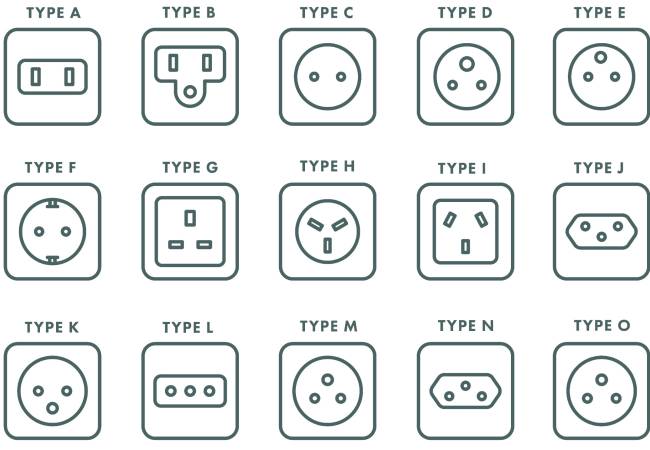
Money
Kenya's currency: Kenyan shilling (KES)
Tanzania's currency: Tanzanian shilling (TZS). However, we recommend you take most of your money in US dollars issued from 2009 or after with the big head design. Please note, Tanzanian shillings may not be imported or exported. There is no restriction on the import of foreign currency provided it is declared on arrival. On leaving Tanzania, you may convert any amount of shillings into hard currency provided you have a currency exchange receipt.
ATM Availability
Visa, Access/Mastercard and American Express cards are sometimes accepted in hotels and for expensive souvenirs but you should NOT rely solely on your credit card, particularly for obtaining cash advances.
Extra Expenses & Spending Money
We recommend you take most of your money in US dollars. Any US dollars cash should be clean, unmarked notes and should be dated no earlier than 2004. It is advisable to bring a mix of denominations including some small notes. British pounds and US dollars can be exchanged on arrival in Nairobi. airport
There is a great variety of souvenirs on sale. We encourage buying items that benefit the local economy and avoiding expensive shopping malls where most of the money may go abroad or to large businesses. Among the local handicrafts, look for Makonde woodcarvings, permitted leather goods, native jewellery, local textiles, batik, soap-stone carvings, precious and semi-precious stones.
Optional excursions:
Nairobi (only possible if you have extra time in Nairobi before or after the trip)
Excursions in Nairobi must be booked through our local partners on the ground. Please call +254 733 523 813 at any time to organise these activities.
- Karen Blixen Museum: US$14 per person
- Giraffe Centre: US$12 per person
- NNP Animal orphanage: US$40 per person (Entry only)
- Safari walk: US$25 per person
- Carnivore Restaurant: US$30-US$35 per person
- Bomas: US$10 per person
- National Museum: US$14 per person
Transfers to/from all of these excursions – price varies depending on the type of vehicle and the number of clients and may include waiting charges
Masai Mara
- Masai village visit: US$20
Serengeti
- Sunrise balloon safari in Serengeti: Can be booked locally for US$540 upwards. Includes champagne and a full English breakfast in the bush.
Zanzibar
- Snorkelling day trip: US$35
- Snorkelling half-day trip: US$20
- Scuba dive: US$80
- Dhow trip: US$40
- Prison Island tour: US$25
- Spice tour: US$25 (half day including lunch)
- Entrance to historical sites: US$5
Tipping
If you feel your leader and crew performed well, you may want to show your appreciation of their services. The sum you choose to give is entirely personal, but as a guide we suggest approximately:
- US$50-US$70 for your tour leader
- US$25-US$35 for each of the other three crew members
It is also courtesy to tip any extra guides/ drivers you may have over the course of the trip, though certainly not compulsory. Shortly after arrival, the leader will suggest to the group that they donate approximately US$30 per person towards a kitty. This money is then used for tipping local guides, hotel porters, drivers etc and will be distributed by the leader. Any money left at the end of the trip will be refunded to the group on an equal basis.
Sustainability and Impact
As a certified B Corp, we’re on a mission to improve our social and environmental impact across all our adventures.
We do this through our innovative Thriving Nature, Thriving People plan.
This ‘nature positive’ approach is designed to help nature and communities thrive in harmony through practical solutions, such as reducing carbon and waste on our trips, supporting conservation projects through the Exodus Adventure Travels Foundation, and rewilding 100 square metres for every Exodus traveller.
Important Information
Your Safe Participation
When booking this trip, you should be confident in your ability to participate in all activities described in these Trip Notes. If you have any doubt about your suitability, please call us and ask to speak to one of the experts on this itinerary.
Although our leaders are well trained to deal with different capabilities, if they have any concerns about someone’s ability to safely take part in an activity, or their impact on other people’s enjoyment, we authorise them to take necessary action which, in some circumstances, may involve asking someone to miss that activity.
By booking this trip you agree to our Booking Conditions which clearly state that our leaders have the authority to do this. In these rare instances we will ensure anyone sitting out is safely provided for and offered alternative options where possible. Refunds will not be provided for activities missed and customers may be liable for additional costs incurred.
Seatbelts
All vehicles used by us should be equipped with working seatbelts, except where approved by us based on the vehicle type or journey. Wherever seatbelts are available, we require our customers to use them for their own safety, even where it may not be a legal requirement.
Travel Safety
For additional information please have a look at the travel safety advice page on our website.
How to Book
Speak to our friendly team of experts to plan your adventure:
- Check availability: our website shows real-time availability or contact our team by phone, email or live chat.
- Hold a space: You can provisionally hold a space to give you time to finalise your travel plans.
- Confirm your booking: Payment of a deposit will complete your booking and secure your place on the trip.
After booking
You will receive a confirmation document and invoice, which includes extra information and guidance about your travel arrangements. Our dedicated Customer Operations team will help you with any pre-travel questions or arrangements and can easily add extensions or extra accommodation to your booking. Final Joining Instructions will usually be sent out two to three weeks prior to departure.
Adding transfers to your booking
If you have arranged your own flights and would like to add transfers to your booking, please provide your arrival and departure details to our Customer Operations team around four to six weeks before departure.
- Where free transfers are included, they are available for any flight but can only be added to your booking once we have received your flight schedule.
- Where group arrival and departure transfers are available, these operate at fixed times. You will need to arrive in time to meet the scheduled transfer. If the timings don’t align with your travel plans, our team can arrange private transfers once they receive your flight schedule.
Trip Note validity
Trip notes may be updated after booking; if any updates significantly impact the inclusions or itinerary you will be advised in writing. A link to the most up-to-date Trip Notes will be sent out with your Final Joining Instructions before departure.
The information in these Trip Notes is given in good faith. All holidays can be subject to unexpected changes, and occasionally it may not be possible to follow the itinerary as planned. In these circumstances we will make the best-possible alternative arrangements that maintain the integrity of the original itinerary.

